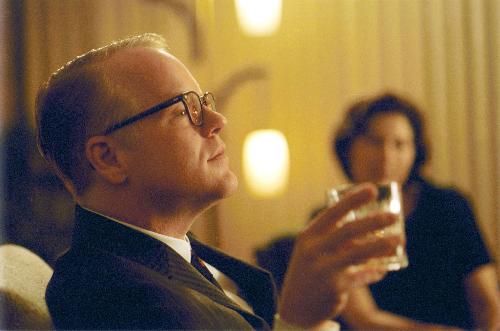
News
Pro-Palestine Encampment Represents First Major Test for Harvard President Alan Garber

News
Israeli PM Benjamin Netanyahu Condemns Antisemitism at U.S. Colleges Amid Encampment at Harvard

News
‘A Joke’: Nikole Hannah-Jones Says Harvard Should Spend More on Legacy of Slavery Initiative

News
Massachusetts ACLU Demands Harvard Reinstate PSC in Letter

News
LIVE UPDATES: Pro-Palestine Protesters Begin Encampment in Harvard Yard
Capote

Directed by Bennett Miller
Sony Pictures Classics
4 Stars
The Harvard-immersed filmgoer should be uniquely equipped to appreciate the pathos of Bennett Miller’s new film, “Capote,” chronicling the time Truman Capote spent researching and writing his novel “In Cold Blood.”
Haven’t we all encountered at least one remarkably talented but socially stunted genius like Capote? And what undergrad worth his Literature and Arts A requirement is not interested in a deconstruction of the literary process?
If that weren’t enough, Miller directs Philip Seymour Hoffman to a haunting portrayal of the complexities of the gadfly author that should satisfy the entertainment hunger in the audience as well.
The sound of stringed instruments that back the opening sequence foretell a disheartening vision of Holcomb, Kansas, closer to the world created by Capote in his “nonfiction novel,” than to the town Capote experienced. The whole movie is strangely meta. Not only are we privy to the story of a writing process, but Miller does his best to capture the mood of Capote’s version of events.
And just like in “In Cold Blood,” and any good biographical movie, you stop nitpicking the details—what did or didn’t happen—and get carried along so properly that you believe what you are seeing must be true.
Most of the praise should be heaped upon the actors who gave themselves to the roles. Catherine Keener’s Harper Lee is demurely repressed, but also a firm adult who keeps the petulant Capote under control. Chris Cooper’s Alvin Dewey strikes the right balance of a character that both chooses to help Capote and to resent his presence. But as every good Oscar-tracker knows, this movie is Philip Seymour Hoffman’s to win or lose.
To portray a man whose daily life was practically a caricature—a persona of who he wanted to be—is far from easy. Anyone who takes on the high-pitched tones of Capote should be, presumably, relegated to parody or mere imitation. But Hoffman is the voice, capturing the pauses and drawn-out phrasing in the undertones of everything he says. Better still is the way he plays Capote’s manipulative tendencies against Capote’s natural charm, and, though it seems clichéd to say it, Hoffman deserves that Oscar nomination.
The humor of Capote, exemplified in his real life by his proclivity to tell amusing anecdotes on the talk show circuit, is convincingly portrayed. Capote’s big-city style, complete with overbearing manner and designer clothing is a stark contrast to the people and the Kansas landscape, full of long, barren shots, leafless trees, and overcast skies. He is the center of attention, not the murders, but the audience doesn’t mind as Capote’s quips break the tension.
Despite a tremendous rookie effort (Miller has one documentary and a slate of TV commercials to his name; writer Dan Futterman, making his screenwriting debut, is better known for his roles in “The Birdcage” or on TV’s “Judging Amy”) there are a few missteps from the new guys. Viewers are pounded with occasional hammer-to-the-head moments, making sure that we clearly see the light bulb lighting up over Capote’s head, or how murderer Perry Smith’s first presence will impact Capote forever.
Further, the two criminals, Smith (played by Clifton Collins Jr.) and Dick Hickock (Mark Pellegrino) aren’t quite up to the high standard set by the more accomplished costars. Some of this may be attributed to the creative team, as Smith seems a little too smooth around the edges and Hickock is unfortunately overlooked, in an effort to demonstrate Capote’s favoritism towards Smith. Further, Hickock is played as a dimwitted buffoon, which would seem to contradict his presentation in the novel as a coldhearted killer.
Few will leave this film liking Capote the man himself, but it is hard to believe that Hoffman’s tortured soul and the uneasy aura set by Miller will be ignored. Like Keener’s Lee we are left torn on this man-child. We are disgusted by much of his behavior, but we want to understand it. Hoffman manages to create a sympathetic character out of a man who seems to lack sympathy, displaying the essence of the esteemed author. “Capote,” like its namesake, captivates.
—Staff writer Margaret M. Rossman can be reached at rossman@fas.harvard.edu.
Want to keep up with breaking news? Subscribe to our email newsletter.
